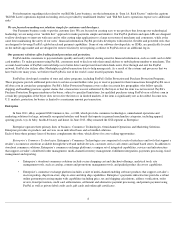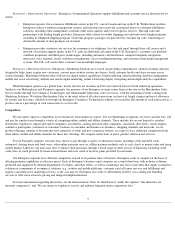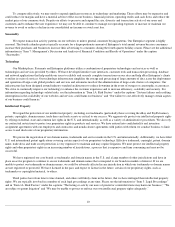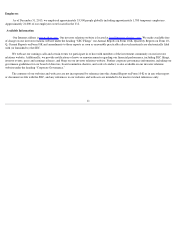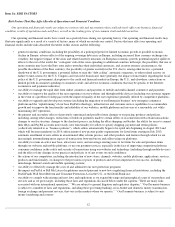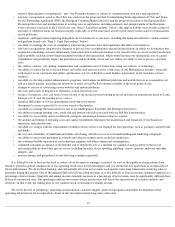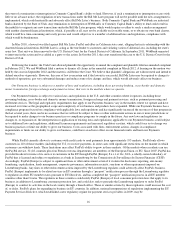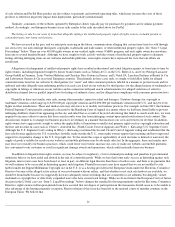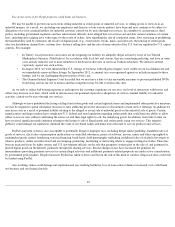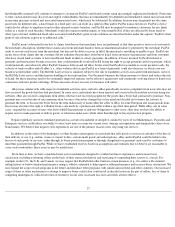eBay 2013 Annual Report Download - page 20
Download and view the complete annual report
Please find page 20 of the 2013 eBay annual report below. You can navigate through the pages in the report by either clicking on the pages listed below, or by using the keyword search tool below to find specific information within the annual report.
more than $500 (subsequently increased to $3,000 in October 2011 and to $10,000 in June 2013). The Reserve Bank has also approved an
application by PayPal's processing bank in India which would permit PayPal to process domestic Indian transactions, subject to the domestic
payment intermediary directions issued by the Reserve Bank and other conditions. The Reserve Bank may again impose a suspension if it is not
satisfied with PayPal's and its partner bank's actions to comply with these guidelines. In the event of any non-compliance, PayPal could be
subject to fines from the Reserve Bank, and PayPal's prospects for future business in India, both cross-border and domestic, could be materially
and adversely affected. In Taiwan, changes to foreign exchange regulations have required PayPal to change its processes in order to continue
offering Taiwanese merchants the ability to receive payments in non-Taiwanese currency and withdraw those payments to their Taiwanese bank
in Taiwanese currency. As a result, PayPal has set up a subsidiary in Taiwan to apply for Taiwanese certification, which would enable PayPal to
declare foreign exchange transactions on behalf of Taiwanese merchants.
Even if PayPal is not currently required to be licensed in some jurisdictions, future localization or targeted marketing of PayPal's service or
expansion of the financial products offered by PayPal in those countries (whether alone or through a commercial alliance, joint venture or an
acquisition) could subject PayPal to additional licensure requirements, laws and regulations and increased regulatory scrutiny. Even if PayPal
does not expand its services in the countries it currently serves, changes in the laws of those countries could also require us to obtain new
licenses or submit new registrations. For example, PayPal has applied for and received a license in the Canadian province of Quebec, has begun
the process of acquiring a license in Brazil and expects that new laws or regulations may require license applications in the near future in Turkey,
China and Hong Kong. There can be no assurance that PayPal will be able to obtain any such licenses. Even if PayPal were able to obtain such
licenses, there are substantial costs and potential product changes involved in maintaining such licenses, and PayPal would be subject to fines or
other enforcement action if it violates disclosure, reporting, anti-
money laundering, capitalization, corporate governance or other requirements of
such licenses. These factors could impose substantial additional costs and involve considerable delay to the development or provision of PayPal's
products in certain countries. Delay or failure to receive such a license or regulatory approval could require PayPal to change its business
practices or features in ways that would adversely affect PayPal's expansion plans or force PayPal to suspend providing products and services to
customers in one or more countries.
Although we do not originate loans under the Bill Me Later service, we do purchase receivables related to the consumer loans extended by
the bank which originates them. One or more jurisdictions may conclude that the eBay company which purchases those receivables is a lender,
money transmitter or loan broker or is otherwise subject to licensure or regulatory approval, which could subject us to liability or regulation in
such jurisdictions. As described under the caption “Bill Me Later's operations depend on lending services provided by unaffiliated lenders”
above, a lawsuit pending against Bill Me Later in the U.S. District Court for the District of Utah alleges that, in its relationship with the former
issuer of the Bill Me Later credit products, Bill Me Later was acting as the true lender to customers in violation of various California laws,
including the state's usury law. Additionally, federal regulators could mandate changes to the relationship between us and the issuing banks of
the Bill Me Later credit products. Any termination or interruption of the issuing banks' lending services to consumers could result in an
interruption of Bill Me Later services, as described above under the caption “Bill Me Later's operations depend on lending services provided by
unaffiliated lenders”.
Our Payments business is subject to anti-money laundering and counter-terrorist financing laws and regulations.
Our Payments business is also subject to various anti-money laundering and counter-terrorist financing laws and regulations around the
world that prohibit, among other things, its involvement in transferring the proceeds of criminal activities. PayPal is focused on compliance with
these laws and regulations and has programs designed to comply with new and existing anti-money laundering and counter-terrorist financing
legal and regulatory requirements. However, any errors, failures or delays in complying with federal, state or foreign anti-money laundering and
counter-terrorist financing laws and regulations could result in significant criminal and civil lawsuits, penalties, forfeiture of significant assets or
other enforcement actions. Any new anti-money laundering and counter-terrorist financing laws and regulations (or changes to, or expansion of,
the interpretation or application of existing laws and regulations) applicable to our Payments business could subject us to additional laws and
regulations, additional licensure requirements and increased regulatory scrutiny, which could force us to change our business practices or limit
our ability to grow our business. Costs associated with fines or enforcement actions, changes in our compliance requirements or limitations on
our ability to grow our business, could have an adverse effect on our financial results and harm our Payments business.
In the U.S., PayPal is subject to regulations that require it to report, within required timeframes, suspicious activities involving transactions
of $2,000 or more, and may be required to obtain and keep more detailed records on the senders and recipients in certain transfers of $3,000 or
more. In addition, regulations governing prepaid access programs, which took full effect in March 2012, require PayPal to take additional steps
to verify the identity of customers who pre-fund a PayPal balance.
18


